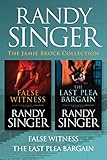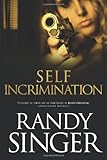
Judge Oliver Finney isn’t your average Christian. And Faith On Trial isn’t your average television reality show. When a wealthy man receives news he is dying from brain cancer, he decides to create a reality show whose contestants will help him know which god is real and what to believe about the afterlife, if there is one. Each contestant from one of the world’s major religions are tested both physically and mentally on a remote island.
Judge Finney, a cigar-smoking believer who is dying from lung cancer, agrees to be on the show as his last shot to put Christianity in a good light. As Finney complies with the shows demands and befriends his fellow contestants, he realizes everyone has secrets. Also suspecting something more sinister at work, he secretly enlists his clerk Nikki to do research for him. If she can’t decipher Finney’s code language and find answers, lives will certainly be lost.
When I requested this book for review, I didn’t realize that it had been previously published as The Cross Examination of Oliver Finney. As a Randy Singer fan, I had already read this title, but as I went through it a second time, it was every bit as exciting as the first. It had been enough years ago that I forgot the ending, so I was on pins and needles just like a first-time reader would be.
Singer adequately presents arguments in favor of Christianity, but also, through the eyes of the Buddhist, Hindu, atheist and Muslim characters, gives reasons why their religions attract many followers. The only view that wasn’t explored fully enough was the atheistic view—for some reason that one was skipped over once or twice. Also, the Jewish contestant was struck from the show early, so the reader doesn’t get to see Judaism from his eyes.
All of Singer’s characters are memorable. Finney is extremely likeable and the reader will be sympathetic to him. For all of Nikki’s faults, she is a work in progress. A few of the cast will be hated, some pitied, others admired, and still others cheered for.
Though the title has changed, nothing about the book changed at all—no dates, events, or technological updates. On that note, camera “tapes” that are referenced in this book are pretty much a thing of the past what with digital technology in place, thus outdating the book a bit. Otherwise, nothing negative stood out. Perhaps a few circumstances that were too convenient, but in fiction that’s allowed. The use of ciphers and codes interested me and were a big part of the last half of the story.
Overall I give The Judge two thumbs up—once for the original release and another for the second.















Leave a Reply